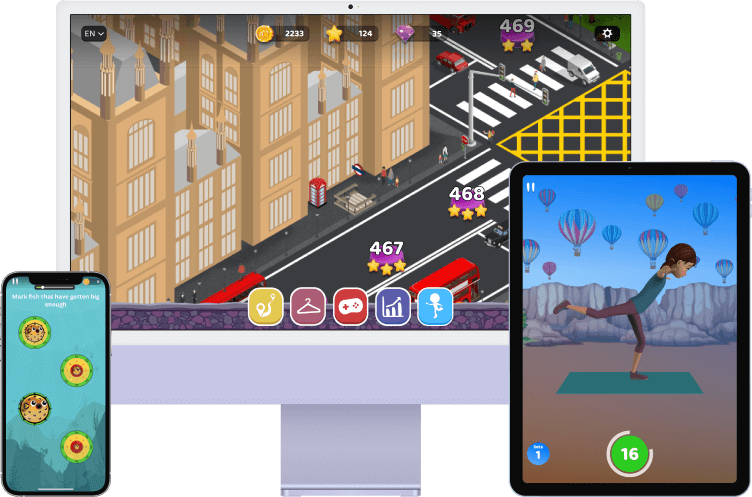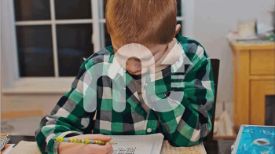Take Online Dyscalculia Test for Adults & Kids
Dyscalculia is an learning disorder that challenges one’s ability to understand and do math. If you suspect that you or your child struggles with the condition, an online dyscalculia test can help. If you wonder where to test for dyscalculia, you are in the right place! Now, you’ll discover a test for dyscalculia and coping strategies to manage it.
Instructions
The purpose of this dyscalculia test online is to help you identify your strengths and weaknesses in math. When you are doing this dyscalculia online test, read each question carefully and select the best answer.
Disclaimer: Please note that the dyscalculia test for adults and kids is only a checklist. This dyscalculia screening test can provide preliminary insights. The results of the dyscalculia self test should not be used without consulting a specialist.
*Remember, making an appointment with your doctor is a must for the final diagnosis.
DISCOVER15 Strategies for Managing Dyscalculia
If you took a dyscalculia test for child or adult and the results suggest that you or your kid might have the condition, there is no need to worry. Here are the best strategies to decrease the symptoms of dyscalculia and improve math skills.
1. Play MentalUP Brain Games
MentalUP is the ultimate app loved by kids and trusted by parents! The certified app offers hundreds of brain training games and physical education exercises to help both adults and kids improve their cognitive development and dyscalculia test results.

With its adaptive algorithm, the app continuously tests users' skills and creates customized daily brain training plans and exercise routines. Users can track how these games and exercises benefit their cognitive and physical development through rich performance-tracking and reporting tools.
MentalUP caters to individuals of all ages, allowing them to discover their unique learning strengths and weaknesses. 👍
Through its engaging and interactive approach, MentalUP improves cognitive skills, such as number sense and spatial awareness. This enables individuals with dyscalculia to enhance their mathematical abilities and boost overall numerical confidence. 😎
Plus, MentalUP is available on any PC, tablet, or smartphone, making it a great resource at home, school, or on the go. It is time to boost your own or your kid’s confidence in math. 💻⌚📱
2. Raise Awareness for Dyscalculia
If you took a dyscalculia test free for yourself or your kid and realized some challenges in learning math concepts, you might feel anxious or frustrated. All you need is to keep calm and raise awareness about having a family member with dyscalculia.

Raising awareness for dyscalculia can help you and others recognize the signs and symptoms of this disorder, seek professional help and support, and find effective strategies and accommodations to cope with math challenges. You can try sharing your experiences or educating yourself and others.
3. Share Your Concerns
When a free dyscalculia test for child indicates that they may have it, it is important to share your concerns with educational experts who can help you.

Therefore, if you have concerns about your child's math challenges, you can talk to their teachers, school counselors, or psychologists. Sharing your concerns with educational experts can help you get a formal diagnosis, access appropriate resources, and learn effective strategies to cope with math challenges.
4. Try Talking or Writing Out Math Problems
A math dyscalculia test shows individuals' challenges when dealing with basic math concepts, like addition and subtraction. When these tests indicate that there is a possibility of dyscalculia, one of the most effective strategies is to talk or write out math problems.

When people talk or write out a problem, they can explain the steps and concepts involved, see the relationships between elements, and check their reasoning. You can try talking or writing out math problems by yourself or with a teacher or tutor.
5. Visualize Problems and Solutions
If your kid took a dyscalculia test for kids and the results are not positive, you can support their learning of basic math skills by teaching them to visualize problems and solutions. Visualization means creating mental images or drawings that represent the problem and solution.

It can help kids make sense of math concepts and see patterns, connections, and strategies that may not be obvious otherwise. Kids can visualize problems and solutions by using diagrams, graphs, charts, tables, pictures, or manipulatives.
6. Break Tasks Down Into Smaller Steps
Whether you're an adult seeking increased productivity or a student aiming for faster task completion, breaking tasks into smaller steps can help. If a dyscalculia test online free suggests you need to change your work or study processes, try using tools, like reminders or mnemonics, to implement this strategy.

Breaking tasks down into smaller steps can help you avoid feeling overwhelmed or confused by complex or unfamiliar math problems. It also allows you to focus on one aspect of the problem at a time, see how each step leads to the next one, and check your work along the way.
7. Develop a Growth Mindset
Acquiring a growth mindset is highly recommended for individuals with specific learning disabilities, like dyslexia or dyscalculia. So if you took a free dyscalculia test for adults or kids and the results were lower than expected, you can try developing a growth mindset.

A growth mindset is a belief that abilities can change and improve through effort and practice. It benefits both you and your kids by promoting learning from mistakes, embracing feedback, seeking challenges, and persevering through difficulties.
To develop a growth mindset, set realistic goals, celebrate progress, praise effort over outcome, and use positive self-talk and appropriate activities.
8. Try Multisensory Instruction
Multisensory instruction is a way of teaching and learning that engages different senses and modalities, such as sight, sound, touch, and movement. It can help both you and your kids learn math better by making it more concrete, meaningful, and memorable.

So if your or your kid's dyscalculia online test free indicates the presence of the condition, you can try multisensory instruction by using various tools and materials, such as manipulatives, flashcards, songs, videos, or games that involve math concepts and skills.
9. Improve Your Number Sense
Number sense is the ability to understand and work with numbers and their relationships. Having a strong number sense can assist individuals with dyscalculia in performing math operations, making estimates, making comparisons, and solving problems more easily.

So if you want to improve the results of your or your kids “do I have dyscalculia” test results, you can try practicing basic math facts, playing number games, using mental math strategies, or estimating answers before checking them.
Do you need a trustworthy resource to enhance your number sense? Discover MentalUP! ✅
MentalUP offers a safe learning environment filled with engaging math games and exercises that foster numeracy skills, number sense, and mathematical vocabulary for both adults and kids. 👏
You can utilize the number sense strategy and overcome learning challenges associated with dyscalculia thanks to MentalUP! 🏆
10. Learn Math Vocabulary
Math vocabulary is the set of words and symbols used to communicate math concepts and operations. Learning math vocabulary can help individuals understand math instructions better, express their thoughts easier, and avoid confusion.

You can learn math vocabulary by reviewing the definitions and examples of math terms and symbols, using flashcards, math word problems, or quizzes to test your knowledge, and applying math vocabulary to real-world situations.
11. Exercise Regularly
Exercise is beneficial not only to your physical health but also to your mental well-being. Routine physical activity can enhance math skills by promoting increased blood flow to the brain, improving memory and attention, reducing stress and anxiety levels, and enhancing mood and motivation.

So if you regularly exercise by doing activities that you enjoy, such as walking, jogging, cycling, swimming, dancing, or playing sports, you can improve the results of a child or adult dyscalculia test.
12. Explore Mental Math Strategies
If you took a free dyscalculia test for adults online, solving problems may be challenging. Mental math strategies are great for helping individuals with dyscalculia to improve their problem-solving skills.

Mental math strategies involve performing calculations in your head, eliminating the need for paper, a pencil, or a calculator. These strategies save time, enhance accuracy, and reduce reliance on memory. You can discover various methods and shortcuts, such as left-to-right addition and using compatible numbers, to explore the world of mental math.
13. Ask for Extra Time and Accommodations
Making adjustments, such as providing extra time and other accommodations, can greatly support individuals with dyscalculia in reducing their stress and improving their performance on math tests.

If your child has taken a dyscalculia test for teenager and the results indicate they have the condition, it is important to communicate with their teacher or counselor, explaining their needs and providing evidence of the diagnosis.
14. Seek Professional Help
Professional help is essential to improving the results of dyscalculia test adults or kids take.

When you understand the causes and effects of dyscalculia and access appropriate resources, you can create effective strategies to cope with math challenges. You can seek professional help for yourself or your kids by consulting a psychologist, educational specialist, neuropsychologist, or tutor who has experience with dyscalculia.
15. Join a Support Group
A support group can help both children and parents cope with dyscalculia by providing emotional support, practical advice, social interaction, and positive feedback. You can also take a support group’s advice on how to test for dyscalculia and read the test results properly.

If you want to join a support group or are looking for one for your kid, you can research online or ask your kid's school to find a support group that meets regularly and offers a safe and supportive environment for people with dyscalculia.
Frequently Asked Questions
So far, we have provided a maths dyscalculia test for adults and kids, as well as shared strategies to cope with learning disabilities caused by dyscalculia. If you still have any questions, here are some frequently asked questions about the topic.
Where can I test for dyscalculia?
You can take a dyscalculia test online or consult an educational psychologist to get a dyscalculia screening test.
How to test people for dyscalculia?
To assess individuals for dyscalculia, it is necessary to have them evaluated by a qualified psychologist or have them take a dyscalculia self test.
How to test if you have dyscalculia as an adult?
You can take a dyscalculia test for adults online or seek a formal diagnosis from a professional who specializes in learning disabilities.
Who can test my child for dyscalculia?
You can have your child tested for dyscalculia by a school psychologist, an educational specialist, or a neuropsychologist who has experience with learning disabilities.
How to test people for dyscalculia?
You need to have them evaluated by a qualified professional who can administer various tests that measure different math skills and abilities.
It is clear that practicing cognitive skills is essential for both kids and adults to keep their minds active and overcome any kind of learning disability.
Are you looking to boost your family members' cognitive skills and physical fitness in a fun and engaging way? MentalUP is here to help! 🎉
MentalUP brings you a delightful collection of 150+ brain training games and 240+ personalized fitness exercises. Tailored to suit your family members' ages and specific needs, these activities are designed to stimulate their minds and keep them active. 🔥
You can join the ever-growing community of over 10 million users who have fallen in love with MentalUP! 👪





